
Chaos and cannabis: A massive hemp empire is accused of growing illegal marijuana and sowing violence on the Navajo reservation
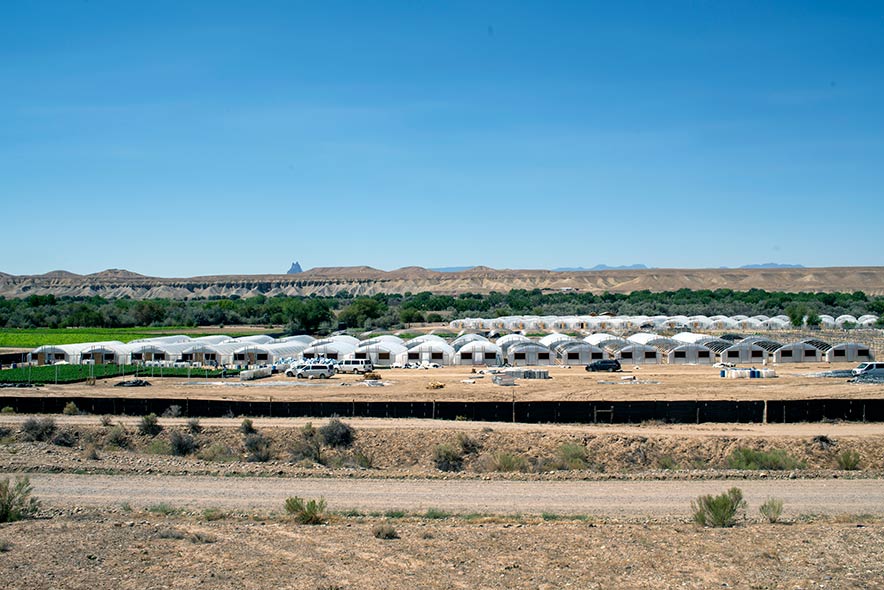
Submitted | Don J. Usner
A large hemp growing operation, involving dozens of greenhouses, near Shiprock.
By Ed Williams
Searchlight New Mexico
SHIPROCK, N.M.
In the fertile northeast corner of the Navajo Nation, fields that only months ago were traditional open-air corn farms are now stuffed with hundreds of industrial-sized greenhouses, each glowing with artificial lights and brimming with emerald cannabis plants. Security cameras ring the perimeters and hired guards in flak jackets patrol the public roads alongside the farms.
Every weekday throughout the summer, a group of local kids woke at sunrise and arrived at the farm by 7:30, ready for a 10-hour shift of hard labor under the high desert sun. Many were teenagers, 13- and 14-year-olds lured by offers of quick cash. A few were as young as 10.
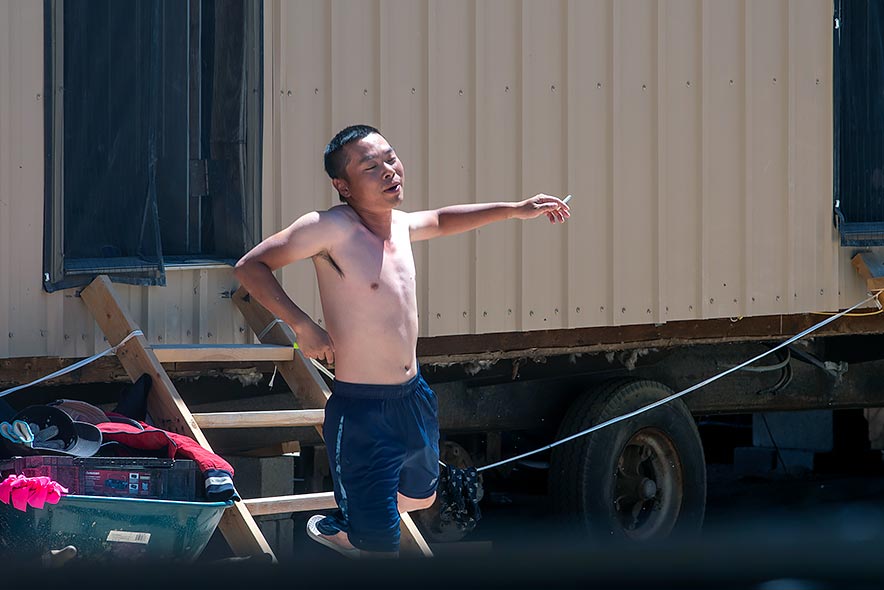
Submitted | Don J. Usner
A laborer, who said he was recruited “to come build something out here by a businessman from LA” steps outside his trailer for a smoke at a cannabis farm.
Joining them were scores of foreign workers — an estimated 1,000 people, many of them Chinese immigrants brought to New Mexico from Los Angeles, according to Navajo Nation Police Chief Phillip Francisco.
Seven-foot-tall black fencing shields the activities inside these greenhouses, but farm workers, neighbors and law enforcement officers have provided an inside view. Chinese managers oversee the day-to-day logistics, they say, bringing in diesel generators on freight trucks to power the greenhouses, installing dozens of cheaply built trailers to house the immigrant workers and drilling unpermitted wells to irrigate thousands of thirsty cannabis plants.
“Some of the Chinese carry guns,” said Darren Gipson, 19, one of seven farm workers interviewed by Searchlight New Mexico. “One time a couple of them got into a knife fight. We just basically do what they tell us and keep to ourselves.”
The cannabis crews arrived in Shiprock last year, at the invitation of the local farm board president, a charismatic and divisive political figure named Dineh Benally. Together, they leased plot after plot of traditional farmland for what they said was an economic development project. The land now totals more than 400 acres, according to the Bureau of Indian Affairs.
The crops, according to Benally, are merely hemp plants — a type of cannabis that is grown for its fiber and processed into over-the-counter health products. Hemp, a common agricultural crop, looks and smells identical to regular marijuana but contains only trace amounts of psychoactive THC.
But according to the seven employees interviewed by Searchlight, the farms are not only growing hemp: They’re also producing high-powered, black-market marijuana.
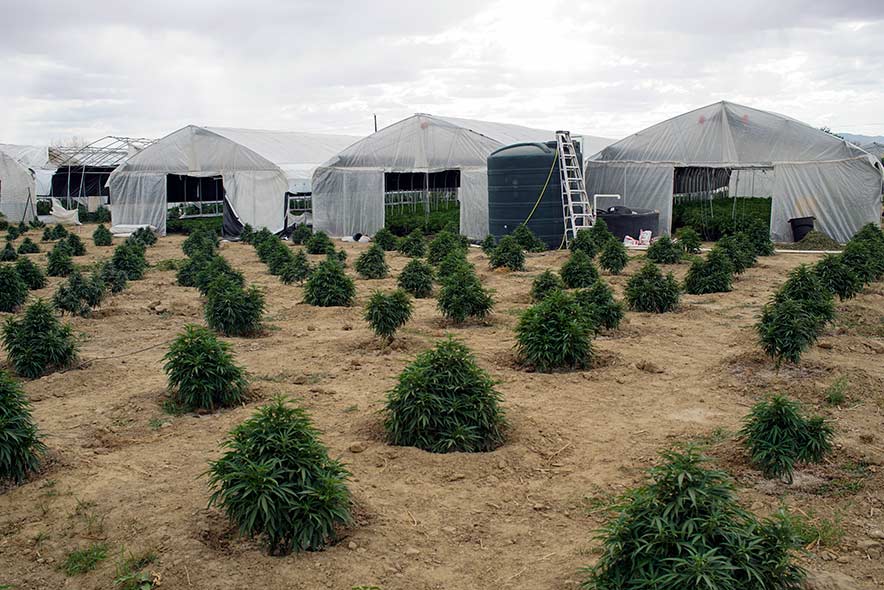
Submitted | Don J. Usner
Hemp plants and greenhouses surround Dineh Benally’s family home.
Irving Lin, a Los Angeles-based real estate agent who is one of Benally’s primary business associates, acknowledged that this was true.
“A few places” are growing marijuana, Lin told Searchlight, adding that most of the crops are hemp. “Some people … might want to give it to their friend or something, or maybe they can sell it for a higher price,” he explained about the marijuana. About 1,000 workers are involved in the operation, he said, verifying the police estimate.
In little more than a year, Benally and his associates have built an audacious empire of unlawful farms in one of the most remote landscapes in the state — a place where law enforcement can find it a struggle to fight routine crimes, let alone investigate what appears to be a sophisticated international cannabis network.
The U.S. Drug Enforcement Agency told Searchlight that Chinese-run marijuana operations are popping up in rural and urban areas around the West — some located just a short drive from the Navajo Nation.
In August 2018, agents from the DEA, the U.S. Attorney’s Office and local law enforcement raided a large black-market marijuana growing operation in Cortez, Colorado, 40 miles north of Shiprock. The raid was part of a federal investigation into a California-linked Chinese drug trafficking network in Colorado. It culminated in May 2019 with the seizure of more than 80,000 marijuana plants — the biggest black-market marijuana bust in state history, the U.S. Attorney’s Office said.
“There are literally thousands of Chinese-operated [illegal marijuana] grow sites throughout Colorado,” said Wendi Roewer, field intelligence manager for the DEA’s Denver field division. Many of them masquerade as hemp farms, she added. “Would they move beyond the borders of Colorado if they felt safe doing so? Yeah, it seems possible.”
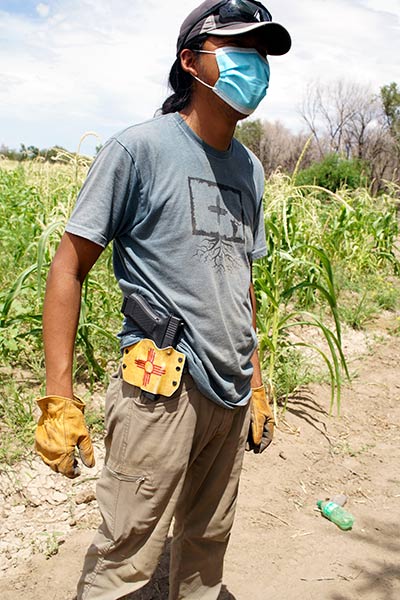
Submitted | Don J. Usner
Zachariah Ben, with a Glock pistol in his belt, takes a break from harvesting corn.
So alarming are the operations in Shiprock that the FBI, New Mexico Attorney General’s Office, Department of Homeland Security, Navajo Nation Police and San Juan County Sheriff’s Office have joined forces to investigate, emails obtained by Searchlight reveal.
Shiprock is a unique, water-rich oasis in the Navajo Nation, a fertile sliver of lush farmland along the San Juan River that cuts through the harsh high desert. Its family-run farms have long been a breadbasket, providing corn — a food staple and a critical part of Navajo ceremonies — as well as melon and squash crops to communities across the sprawling reservation. Many residents see the cannabis farms as a threat to that tradition.
“Corn is a sacred plant,” said Bea Redfeather-Bennally, whose home borders a large hemp farm that was until recently a corn field. “You can’t eat hemp and marijuana. It hurts me to see how much disharmony and dysfunction this cannabis has brought to our people.”
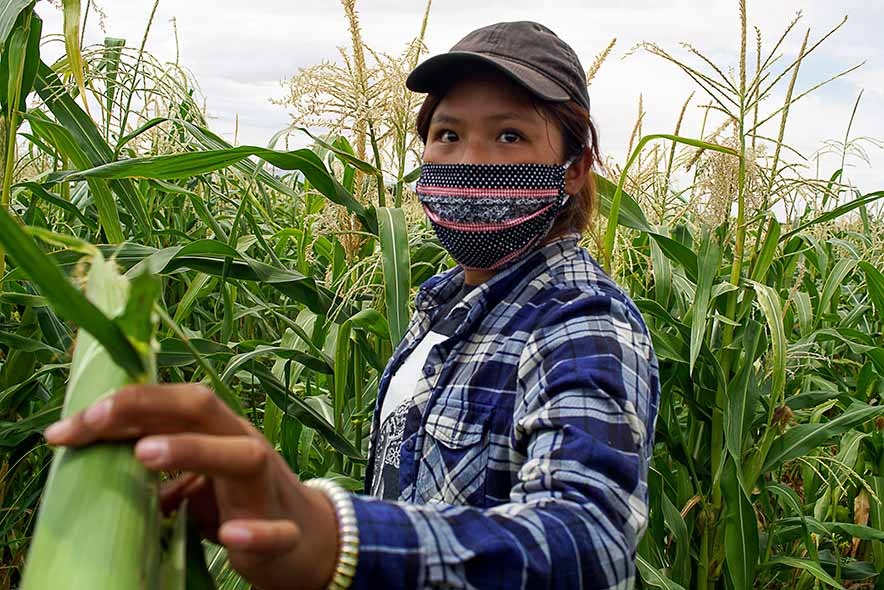
Submitted | Don J. Usner
Zeandra Arthur, an intern on Ben Farms in Shiprock, harvests traditional Navajo white corn corn.
Heated confrontations have erupted between cannabis farmers and throngs of Shiprock residents frustrated with the tribal government’s slow response. On at least a dozen occasions, angry protesters have marched to the gates of the farms, sometimes blocking roads, shouting at the workers and carrying placards reading “Stop the Asian Invasion, No Human Trafficking” and “This is Navajo Land, Not China.” Greenhouses have been set on fire. Benally was charged with aggravated assault after allegedly attempting to ram his car into a group of protesters on Sept. 24, Police Chief Francisco said. (Benally and his attorney, David Jordan, declined to answer numerous requests for comment; as of press time, it was not known whether Benally had entered a plea to the charge.)
Some neighbors say they have begun carrying weapons, vowing to shoot any cannabis farm worker who steps onto their property.
The tensions have become so extreme that when a corn farmer died of natural causes in his field on Sept. 19, rumors quickly spread that he had been beaten to death by Chinese cannabis farm workers. Expecting a showdown, a group of armed corn farmers rushed to the neighborhood where the man had died, prepared for a shootout.
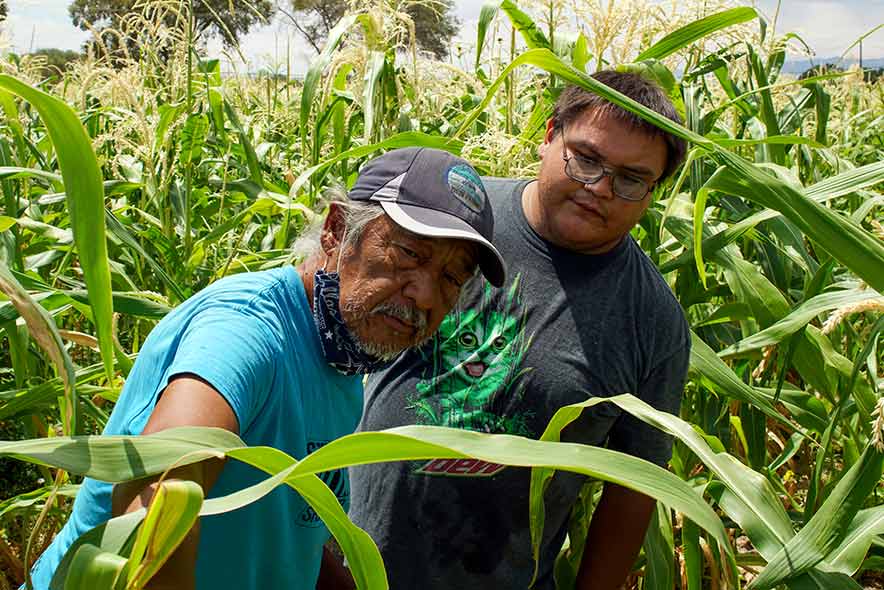
Submitted | Don J. Usner
Joe Ben, director of Ben Farms, shows Stephen Hoski how to harvest traditional Navajo white corn, in Shiprock.
“This is our home, and we’re going to fight to defend our way of life even if that means we have to shoot someone,” said Joe Ben, a prominent corn farmer and outspoken opponent of the cannabis farms who now harvests his crops with a loaded shotgun and a Glock 9mm at the ready.
“It’s a miracle nobody has gotten killed over this yet already.”
“Dangerous jobs”
Most mornings this summer, the Navajo kids said they spent an hour or so cleaning up the trash from the raucous parties that were an almost nightly occurrence on the farms, then awaited orders from their shift bosses.
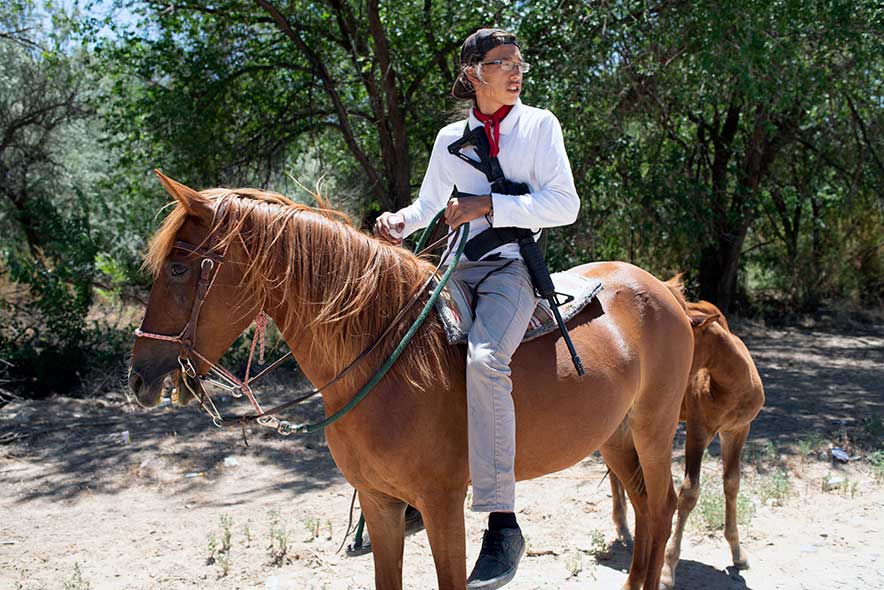
Submitted | Don J. Usner
Like others in the Shiprock area, this man – who identified himself only as Alex and said he was unaffiliated with either side – carries a weapon out of concerns about security.
The work was grueling — employees hauled 60-pound bags of soil throughout the labyrinthine networks of greenhouses, handled dangerous chemicals and operated heavy machinery. The hourly cash pay was $5. At least two kids on the work crews were 10 years old, employees said.
“They always give the Navajos the dangerous jobs,” said Gipson, the 19-year-old employee, recalling an instance in which he and his uncle fumbled an unlabeled container of acid they were told to carry, splashing some of it on their hands and on the ground, where it frothed “like the blood from Alien vs. Predator.”
On good days, their supervisors assigned them to the “dark room,” where they trimmed buds with the sharp blades of a whirring, mechanized metal fan, getting piles of dope ready to load onto the moving trucks that arrived weekly.
“There’s Blue Cookie, Northern Lights, Skywalker OG, Blueberry Kush, Sour Diesel, Jet Fuel,” said Amber Brown, 20, ticking off the marijuana strains she and other workers said were written on plastic labels tucked into the pots.
Ever since the large greenhouse operations began appearing on the reservation in 2019, Benally has described the farms as legal hemp enterprises. As farm board president, he also claims he has the authority to license hemp farms.
Hemp cultivation is against the law without approval from the federal government, and Benally does not have that approval, according to the U.S. Department of Agriculture.
He also lacks the authority to grant hemp licenses or to independently lease farmland on the reservation, according to a lawsuit filed against him in June by Navajo Nation Attorney General Doreen McPaul. The suit charged Benally and his businesses, Native American Agriculture Company and Navajo Gold Company, with illegally growing industrial hemp and unlawfully issuing land use permits for his industrial hemp project, putting “the People of the Navajo Nation at risk.”
On Sept. 18, a Navajo court issued a temporary restraining order requiring Benally to halt all operations on his farms.
“We’ve lost minimum $20 million” because of the restraining order, Irving Lin said, explaining that he and his partners had built almost 1,000 greenhouses at $10,000 apiece, and invested $10 million in farm infrastructure.
“We have spent so much money for our community,” he said. He couldn’t understand why the people on the reservation didn’t appreciate it, he added.
“Father” of Native hemp
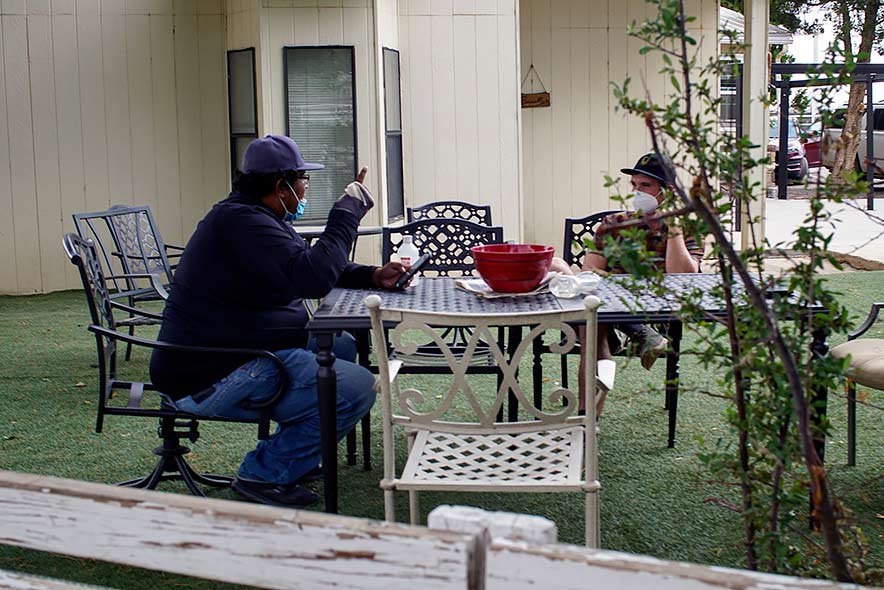
Submitted | Don J. Usner
Dineh Benally speaks with Searchlight reporter Ed Williams and Benally’s family home in Shiprock.
A marijuana enthusiast who has dubbed himself the “Father of Native American Hemp,” Benally has frequently advocated for more tribal investment in cannabis. In 2017, he tried and failed to get medical marijuana cultivation legalized in the tribal legislature. He ran for tribal president in 2018 and in the 2020 Democratic primary for U.S. Congress; he lost both times.
In 2019, Benally partnered with a Las Vegas-based financier named DaMu Lin, CEO of One World Ventures Inc., a publicly traded company that says it invests in cannabis projects on Native American land. DaMu Lin (no relation to Irving), who describes himself on Facebook as an “International Man of Business,” appointed Benally to the One World Ventures board of directors in March 2019, according to a company press release. The Shiprock operation also obtained funding from SPI Energy Co., a publicly traded company based in Hong Kong.
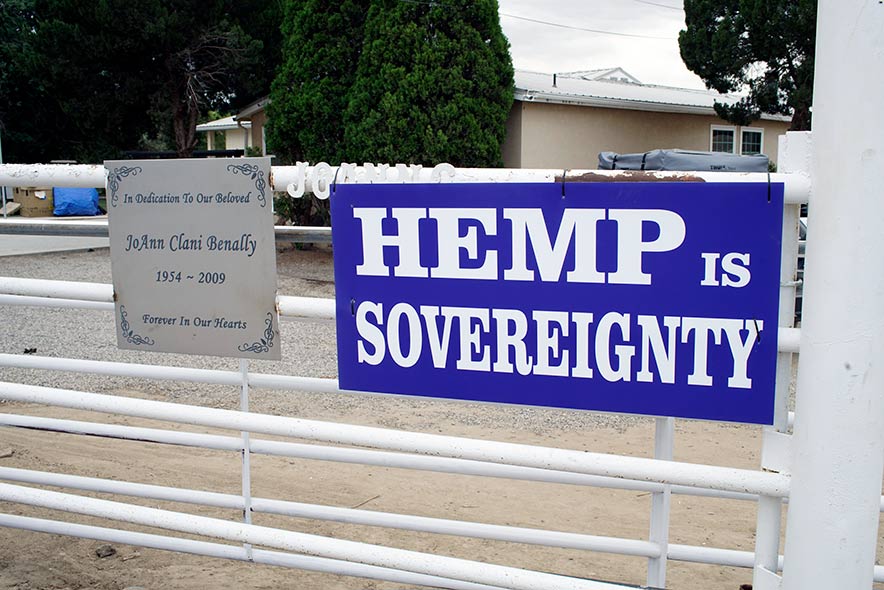
Submitted | Don J. Usner
Signs supporting hemp farming at Dineh Benally’s family home.
“This is about sovereignty,” Benally told Searchlight in an interview in August. “The tribe has been failing us. These farms belong to the people, and so the people control what they want to grow,” he said, explaining that the crops being grown were hemp.
“Yeah, right,” one worker, Ven Yazzie, laughed when told about Benally’s explanation. “All I know is, you smoke it, it gets you high.”
Reaching into his backpack, he pulled out three containers of purple and lime-green buds that he said were given to him by a farm supervisor — a common incentive offered to the Navajo workers, according to multiple employees. He reached out his hand.
“Here, why don’t you go see for yourself?”
Although the origin of those samples could not be confirmed, Searchlight took them to a state-certified laboratory for analysis. Each contained between 20 percent and 27 percent THC — a higher concentration than the THC content of many marijuana strains sold in recreational dispensaries.
“That’s a very good plant,” Lin said, adding that he did not know any specifics of the strains tested by Searchlight. Describing the plants on the farms, he said, “I think about 80 [or] 90 percent is 1.4, 1.5 percent [THC]. But some could be higher.”
Parking lot payday
On Aug. 6, Dineh Benally parked his white Cadillac Escalade in front of the City Market grocery store, the busiest parking lot in the town of Shiprock, where a reporter watched as he reached his arm out of the dark tinted windows and palmed fist-sized rolls of cash to cannabis farm workers.
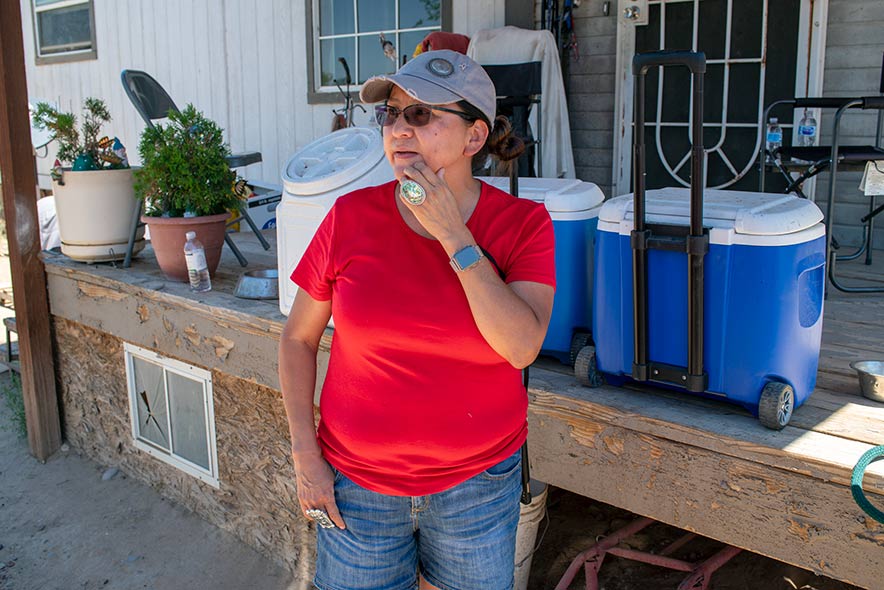
Submitted | Don J. Usner
Bea Redfeather Benally at her home adjacent to a large hemp operation.
It was a cavalier way of doing business, given the growing tensions between anti-hemp Shiprock residents and Benally’s supporters and crew. The week before, at least 100 community members and activists from the American Indian Movement had converged in protest, shouting through megaphones for Benally to resign from the farm board. Several traditional corn farmers, some claiming the cannabis farms had disrupted their irrigation lines and stolen their water, carried guns.
Other community members have described seeing Asian farm workers apparently trying to flee the farms, sometimes standing on the dusty reservation roads with suitcases trying to catch a ride out of town; sometimes waiting outside of gas stations asking for help getting home.
One resident, Marlene Frank, recounted how back in June, a Vietnamese woman had appeared at her family home in a remote part of Shiprock — lost, disoriented, begging for water and asking for help to get back to Saigon.
Such scenarios raise “clear red flags for labor trafficking and severe exploitation,” said Stephanie Richard, senior policy advisor at the Coalition to Abolish Slavery and Human Trafficking, a Los Angeles-based human rights group.
“Authorities would be remiss not to investigate it as such,” she added.
Law enforcement has in fact voiced concerns about possible human trafficking on the cannabis farms. In July, San Juan County Sheriff Shane Ferrari was so suspicious that he requested an investigation by Immigration and Customs Enforcement. An agent from ICE reviewed the immigration status of a group of farm workers and did not investigate further, Ferrari said, leaving the trafficking question unresolved.
Cracks in the law
From the beginning, law enforcement has believed that Benally’s farms were trafficking in illegal marijuana, emails obtained by Searchlight show.
But investigators say they have been hampered by a tangle of tribal, state and federal jurisdictional issues and a confusing legal landscape around hemp and marijuana cultivation.
This type of hemp cultivation is not specifically singled out as a criminal offense under tribal statutes, which has kept Navajo police from obtaining a search warrant, according to Chief Francisco. His Navajo Police department has limited jurisdiction over crimes committed by non-Natives on the reservation. Most of the sheriff’s department’s authority ends at the reservation boundary.
“We have some very high suspicions that the large majority of what [Benally] is growing is marijuana,” Francisco said. “He’s probably got millions of plants, and it’s very frustrating because we haven’t been able to prove that it’s not hemp.”
“I’ve never seen anything like it,” said San Juan County Sheriff Shane Ferrari, who is part of the group of federal, state and tribal law enforcement officers investigating the farms. “He’s out there doing all this in the open, and meanwhile we’re all scratching our heads wondering where the hell do we find this on the books?”
On at least one occasion they came close to a bust.
At around 3:30 p.m. on June 15, San Juan County Sheriff’s deputies responded to an anonymous report of a large marijuana grow in an old industrial building in Kirtland, New Mexico, just beyond the northeast border of the reservation. The building had been rented by Irving Lin.
Inside the Kirtland grow house, the deputy found nearly 2,000 marijuana plants, tended by a Chinese man who did not speak English, according to sheriff’s reports.
When the deputies’ field-testing kit picked up elevated levels of THC, they told the man they would be back the next day with an investigator from the New Mexico Department of Agriculture. Just a few hours later, a group of men pulled up to the building in a U-Haul, loaded the plants inside and drove away, never to be seen again, according to Sheriff Ferrari. The building burned in a large fire a little more than a week later. Law enforcement labeled the incident a “negligent arson;” no arrest was made.
In the days since the tribal court issued its restraining order, workers have been instructed to leave the farms. Navajo police are attempting to enforce the court’s order, even as some farms continue operations, Francisco said.
Neighbors describe seeing the Asian workers sleeping in fields and ditches, shivering through the night and unsure of where to go.
“Mr. Benally brought these workers here under false pretenses,” Francisco said. “They transplanted their lives here thinking they were going to be working on a legitimate project, only to find out that it’s all illegal. They’re really victims too.”








 Highway 264,
Highway 264, I-40, WB @ Winslow
I-40, WB @ Winslow